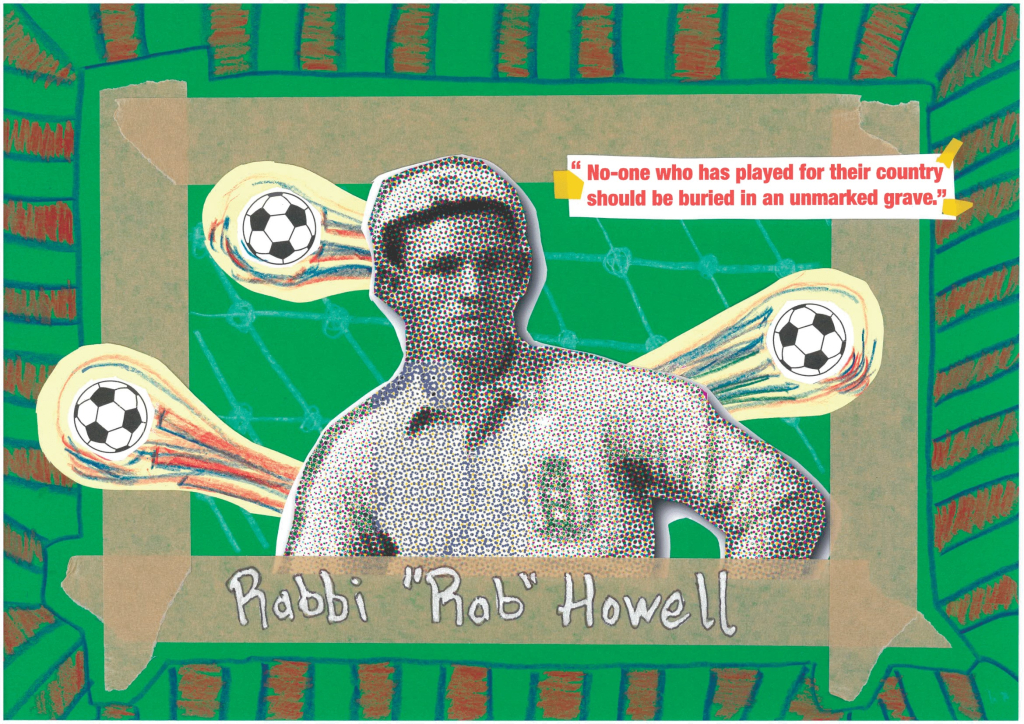Super Rabbi Howell: The First Romani Footballer
30 December 2024

By The Welsh Socrates
This article comes from the anti-racist fanzine ‘A Sporting Chance’, created by the ERRC in 2024 to highlight the experiences of Roma, Sinti, & Travellers fighting racism through sport as part of the EU-funded Moving On project.
Arguably the first professional Romani sportsperson was an Englishman named Rabbi “Rab” Howell. Rab made his international football début on Saturday 9th March 1895 against Ireland during the opening match of the Home International Championship. England were on a record 15-match unbeaten run, with a home record of six wins in a row. As they took to the rain-drenched field of the Derbyshire County Cricket Ground wearing their trademark “white jerseys and navy-blue knickerbockers”, a 10,000 strong crowd urged them on. Just three minutes in, a corner ball came off Irish defender Sam Torrans and, as the commentor remarked, “glanced into the net harmlessly” as an own goal. In just over 10 minutes, England scored twice more and by 30 minutes another Irish own goal from Tom Gordon put England 4 – 0 up. At 36 minutes, Rabbi Howell “sent in a beautiful shot out of a loose scrimmage, against which [Irish goalkeeper] Gordon had no chance.” Another four English goals in the second half brought the match to an eyewatering 9 – 0 close. The following Monday morning, The Times described “a brilliant victory” in which “both forward and behind, the superiority of the Englishmen was very marked.”
Born in the middle of the afternoon...
Rab was born in a tent at a Romani camp in Dore, Sheffield in 1867. As a child he travelled with extended family before settling in Ecclesfield. There Rab worked as a coalminer while playing football for the local side. He played a short while for the Rotherham Swifts before signing his first professional contract with Sheffield United in 1889.
Rab only played one more time for England, despite being regarded as one of the best half-backs of his day while playing for Sheffield United. In 19th-century England, selection for the national team still favoured gentlemanly players with a certain sentimentality towards amateur (and therefore upper-class) sportsmanship and values. Rab was a player who was frequently brought before disciplinary hearings at Sheffield United and his ungentlemanly ethnicity was never far from the minds of those in the club or selection committees. His teammate Ernest Needham once said that Rab "a Gypsy by birth, perhaps owes some of his inexhaustible vitality to his lucky parentage. Certain it is that no man is more untiring.” In the press, Rab was simply known as “The Gypsy” and often played up to the image by telling reporters that he lived in a caravan in the woods.
A very Victorian scandal
Rab’s 200 match career at Sheffield United was cut short when he was suddenly transferred to Liverpool in 1898, just two games before the end of the season in which United won the league. Reasons for the move are not clear, but several accounts point to Rab having left his wife and family to be with another woman as the probable cause. This was still Victorian England, and adultery was a public scandal that the football club could ill afford.
Rab began his career at Liverpool, following a £200 transfer, by starting against Aston Villa. He went on to make 68 appearances for Liverpool over three years before moving to Preston North End in 1901. After more than 60 appearances in Preston, Rab’s footballing career was ended in a match against Burnley in 1903 when his tibia was badly fractured in a tackle. The sound of the break could be heard around the ground and spectators, knowing his career was over, did a whip-around to collect 24 pounds, 15 shillings and six-pence for him (the equivalent of about two months wages at the time).
Retirement, racism, and remembrance
After his retirement from football, 36-year-old Rabbi Howell worked as a labourer and a night watchman, before running a fruit and vegetable business in Preston until 1931. He died in 1937 at his home in Preston at the age of 69 and was buried in an unmarked grave.
Rab’s potential legacy as an early England great was never established because of the prevailing views of the time. He was likely passed up for international duty because of a combination of his class and his ethnicity. There are no records of the racist abuse he undoubtedly faced from the terraces, but we can assume he received his share. To this day, chants of ‘gyppo’ can be regularly heard around football grounds across the United Kingdom and are hardly remarked on by the footballing public or commentators who would otherwise be rightly outraged by other ethnic slurs cast at ethnic minority players.
Rab’s story has been resurrected and his name remembered in recent years in no small part thanks to the biographer Stephen Kay, who researched and wrote a book on the life of the player. Stephen also organised a campaign along with Rab’s remaining family to buy a tombstone to mark the footballer’s final resting place, saying that “no-one who has played for their country should be buried in an unmarked grave.”
In 2015, following a public campaign and many donations, including from Preston City Council and Football Unites Racism Divides, a new headstone was placed over the grave. It bears the inscription: Here lies Rabbi Howell of Sheffield United, Liverpool, Preston North End and England. First Romani Professional Footballer.




